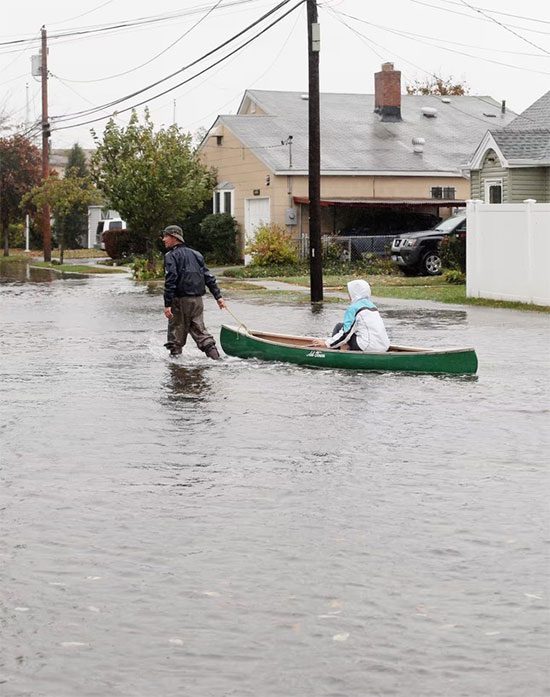Is the rising rate of anxiety, depression, attention deficit hyperactivity disorder (ADHD), post-traumatic stress disorder (PTSD), and Alzheimer’s disease related to high temperatures and other extreme environmental changes?
In late October 2012, a Category 3 hurricane named Sandy struck New York (USA), causing over $60 billion in damages, resulting in dozens of fatalities and forcing 6,500 patients to evacuate from hospitals and nursing homes. However, a neuroscientist believes that the storm presented an opportunity.
Before the unexpected arrival of the storm, Dr. Yoko Nomura—who teaches psychology at Queens College, CUNY, and at the Icahn School of Medicine—had gathered a research team comprising hundreds of young mothers in New York. Her 2009 study, titled “Stress During Pregnancy”, aimed to explore the potential risks of prenatal stress on the fetus. Dr. Nomura investigated how stressors could induce changes in gene expression, factors believed to influence the risk of neurodevelopmental disorders in children, such as autism, schizophrenia, and ADHD.
However, the storm posed a new question for her research: Did the experience of mothers going through a catastrophic storm have different effects on their children compared to those born before or after the hurricane?
More than a decade later, Dr. Nomura found the answer. The findings revealed a shocking difference: children still in the womb during Hurricane Sandy faced extremely high risks of mental health issues later in life. For instance, girls exposed to Sandy, even before birth, experienced anxiety levels 20 times higher and depression rates 30 times higher than those not exposed. Boys were at a 60-fold increased risk of ADHD and a 20-fold increased risk of behavioral disorders. Symptoms of these conditions manifested as early as kindergarten.

Flooding in New York, October 2012, after Hurricane Sandy.
Dr. Nomura and her colleagues’ research also raised a new issue in the climate crisis: that climate change is not only shaping the environment we live in but also our very brains. Changes caused by fossil fuels—from rising temperatures to extreme weather and increased atmospheric carbon dioxide—are altering our brain health, affecting everything from memory and executive function to language, identity formation, and even brain structure.
Evidence comes from various fields. Psychologists and behavioral economists have demonstrated how sudden spikes in temperature lead to increases in everything from domestic violence to hate speech online. According to cognitive neuroscientists, heightened temperatures and elevated CO2 levels impair our decision-making, problem-solving, and learning capabilities. Pathogens related to the brain, such as ticks and mosquitoes, are expanding their habitats as the world warms.
Dr. Burcin Ikiz, a neuroscientist at the mental health charity Baszucki Group, is particularly concerned about the neurodegenerative effects of the climate crisis. Prolonged exposure to high temperatures can activate numerous biochemical pathways related to neurodegenerative diseases such as Alzheimer’s and Parkinson’s. Air pollution similarly exacerbates these effects. Thus, the continued burning of fossil fuels—whether directly or indirectly—could lead to dementia. Warmer weather also worsens symptoms of neurodegeneration.
Other scientists have noted these factors as well. “Signs of Alzheimer’s are increasingly developing in infants, children, and urban youth in Mexico City” is part of the title of a recent paper led by Dr. Lilian Calderón-Garciduenas, a toxicologist at the University of Montana (USA). The researchers investigated the detrimental effects of urban air pollution on biological markers of neurodegeneration and found signs of Alzheimer’s in 202 out of 203 brains they examined, from individuals aged 11 months to 40 years. Dr. Calderón-Garcidueñas and her colleagues wrote: “Alzheimer’s begins in the brains of young children and affects 99.5% of urban youth—a serious health crisis.”

Pollution in Mexico City, Mexico,
Dr. Ikiz indicated that the number of Alzheimer’s cases is projected to triple by 2050—without even considering the climate crisis. “That worries me,” she stated. “Because by 2050, we will be thinking about when we need to start doing something, but it may already be too late for many.”
“I think that’s why it’s essential to speak out and raise awareness about these issues, while the evidence continues to emerge and we understand more and more. Because no one wants to suffer damage that is irreparable,” she added.
For Dr. Nomura, it all comes back to stress. She believes that under the right conditions, exposure to prenatal stress can actually have a protective effect. “It’s like vaccination,” she explained. “You are artificially exposed to something, and you learn how to cope with it better—as long as it’s not too toxic.” Moderate stress during pregnancy can help the fetus resist the most harmful effects of stress later in life. “But there are certain limits,” she noted.


















































